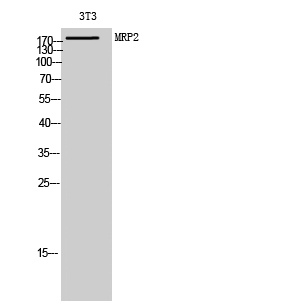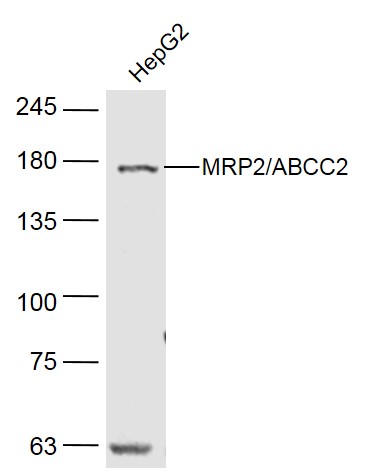MRP2 antibody [M2III-6]
GTX23373
ApplicationsImmunoFluorescence, Western Blot, ImmunoCytoChemistry, ImmunoHistoChemistry, ImmunoHistoChemistry Frozen, ImmunoHistoChemistry Paraffin
Product group Antibodies
ReactivityHuman, Rat
TargetABCC2
Overview
- SupplierGeneTex
- Product NameMRP2 antibody [M2III-6]
- Delivery Days Customer9
- Application Supplier NoteOptimal dilutions / concentrations should be determined by the end user.
- ApplicationsImmunoFluorescence, Western Blot, ImmunoCytoChemistry, ImmunoHistoChemistry, ImmunoHistoChemistry Frozen, ImmunoHistoChemistry Paraffin
- CertificationResearch Use Only
- ClonalityMonoclonal
- Clone IDM2III-6
- Concentration0.1 mg/ml
- ConjugateUnconjugated
- Gene ID1244
- Target nameABCC2
- Target descriptionATP binding cassette subfamily C member 2
- Target synonymsABC30, CMOAT, DJS, MRP2, cMRP, ATP-binding cassette sub-family C member 2, ATP-binding cassette, sub-family C (CFTR/MRP), member 2, canalicular multidrug resistance protein, canalicular multispecific organic anion transporter 1, multidrug resistance-associated protein 2
- HostMouse
- IsotypeIgG2a
- Protein IDQ92887
- Protein NameATP-binding cassette sub-family C member 2
- Scientific DescriptionThe protein encoded by this gene is a member of the superfamily of ATP-binding cassette (ABC) transporters. ABC proteins transport various molecules across extra- and intra-cellular membranes. ABC genes are divided into seven distinct subfamilies (ABC1, MDR/TAP, MRP, ALD, OABP, GCN20, White). This protein is a member of the MRP subfamily which is involved in multi-drug resistance. This protein is expressed in the canalicular (apical) part of the hepatocyte and functions in biliary transport. Substrates include anticancer drugs such as vinblastine; therefore, this protein appears to contribute to drug resistance in mammalian cells. Several different mutations in this gene have been observed in patients with Dubin-Johnson syndrome (DJS), an autosomal recessive disorder characterized by conjugated hyperbilirubinemia. [provided by RefSeq, Jul 2008]
- ReactivityHuman, Rat
- Storage Instruction-20°C,2°C to 8°C
- UNSPSC41116161







